- Home
- Chris Wraight
Swords of the Emperor Page 8
Swords of the Emperor Read online
Page 8
Verstohlen watched them silently as they passed. It seemed a poor reward for all their heroism. And yet what else would they want? Would a king’s ransom really make them happy? They would just drink it away all the same. They were the Emperor’s fodder, nothing more, nothing less, and all knew it.
He sighed and turned away from the sight. Such thoughts depressed him. He wondered, not for the first time, what he was doing amongst them. Better, perhaps, to have stayed in the more genteel world of lore and study. But he had made his choice, and the reasons for it hadn’t changed. Every man had his fate mapped by the gods, and he knew what his was.
He began to pack his belongings away in his slim leather bag. The pistols were safely cleaned and bolstered, his blade sheathed.
“Verstohlen!” came a familiar voice. It was Bloch. The man strolled up to him, looking like he’d inherited the fortune of Araby, and then drunk it. “It looks like you have some use after all. Get used to having me around. The big man’s promoted me!”
Verstohlen feigned surprise.
“That’s truly impressive, Herr Bloch. My congratulations to you. It makes me feel a little better for having drawn you into Grunwald’s rescue.”
Bloch grinned. He must have found some ale from somewhere.
“I won’t forget it,” he warned. “Next time we’re in a tight spot, I’ll call in the favour. You keep your wits about you, Verstohlen!”
Then he was off, walking unsteadily down the Bastion. He, at least, had found something worth celebrating.
“Enjoy it while you may, my friend,” whispered Verstohlen to himself.
Then he pulled his coat about him, slung his bag over his shoulder and made his way down the slopes of the Bastion, back into the Cauldron, ready to start the journey home.
CHAPTER FOUR
Altdorf. Greatest city of the Old World.
Marienburg may have been larger, Nuln older, Middenheim more warlike, Talabheim stronger. But none of those pretenders could compete for sheer exuberance and unruly majesty with the home of the Emperor Karl Franz. At the mighty confluence of the Talabec and the Reik, where the pure waters running down from Averland mixed with the silt-laden torrents from the heart of the Drakwald, the spires, towers and crenulated bridges all jostled for space. Ships rubbed up against each other in the crowded harbours, rocking gently on the grey, filmy waters. Vast warehouses stood on the quaysides, rammed with goods both legal and contraband. Tenements crowded next to one another along the twisting alleyways and stairwells. Like the long-forgotten forest that had once stood on the ancient site, the buildings competed with each other for the light, strangling and throttling one another as they strained ever upwards.
The lower levels had been left behind by the race towards the sun. They were now half-drowned in bilge and the haunt of none but brigands, cutthroats or worse. And yet somehow, amidst all the violence and squalor, buildings of an awesome grandeur and vision had been raised on such foundations. The Colleges of Magic, varied and inscrutable, towered over the streets around them. The Imperial University, unwittingly built on the site of human sacrifices in the pagan days before Sigmar, stood proud and austere in the bright sunlight. Huge garrisons broke the skyline, each stuffed with arms and the men to wield them. Slaughterhouses, temples, marketplaces, mausoleums, scriptoria, merchants’ apartments, monasteries, brothels, cattle pens, counting-houses, all ran up against one another. Like a priest caught in bed with a prostitute, the high and noble rubbed shoulders—sometimes more than shoulders—with the filth and desperation of the gutter.
The narrow towers rose high over the lapping waters of the Reik. Chimneys belched out steady columns of muddy brown filth, staining the whitewashed walls a dirty flesh colour. Yet none of these buildings was more than a footnote to the mightiest of them all. The sprawling, ancient, ever-changing, ever-evolving Imperial Palace stood in the very heart of the city. Like the city it dominated, the palace was an architectural mess. Gothic arches of dark stone rubbed up against graceful elven-inspired gardens. Huge fortifications, some semi-ruined, were piled up against flimsy wattle-and-daub outhouses. Immaculate baroque halls of gold and copper were placed right next to boiling ceremonial kitchens, stinking with cooking fumes and slopping with goosefat.
No single man knew the full extent of the Imperial Palace. It descended into the bowels of the earth for nearly as far as its squat towers rose above the city. Many rooms within it had been left to fall into ruin, or were flooded, or had been locked in ages past to keep some terrible secret from the hands of the unwary. Few ventured into those uncharted areas at night unless driven by some awful need. There were strange things buried in the deep places, accumulations of generations of Emperors and their servants. When the candle-flames went out, not all the shadows were natural.
Even in the normally habitable regions, officials guarded their little kingdoms with obsessive jealousy. Vicious feuds, some stretching back across many lives of men, dominated the corridors of power. Behind the artful politesse and diplomacy, access to the Emperor and his court was ruthlessly sought. When it was secured, it was clung on to. The entire place was a microcosm of the world outside, complete with its civil wars, power struggles, dynastic manoeuvrings and applications of subtle poison in the dark.
And yet, somehow, out of all this ceaseless intrigue and politicking, the business of the Empire was conducted. From the gilded salons and audience chambers, orders were given. Inscriptions were made on parchment and vellum, and scribes passed them to officials and commanders. Though no one could track the paths these orders took, far less trace them back to their author, laws were made and decisions were taken. Trade agreements were entered into, appointments were made and broken, lands were granted and taken away. Most importantly, the armies of the Empire were deployed. From the stroke of a quill deep in the candlelit study of some grey-skinned scribe, a thousand men on the other side of the Empire could find themselves sent on campaign, or disbanded, or ordered back to barracks. Thus, imperfectly and with many detours, was the will of Karl Franz enacted across his domains.
So it was that weeks after the victory at the Turgitz Cauldron, a homecoming parade was ordered in honour of the Emperor’s Champion. Gold was procured for the event by means both legal and dubious. Hundreds of officials left their regular tasks to bend all their attention to it. Times were harder than usual across the Empire. Ceaseless war had taken its toll and the people were weary. When a great victory came, it needed to be celebrated. For no more than a moment, the impoverished masses would believe that all their troubles were over.
For as long as the procession lasted and the ale flowed, they would think humanity the undisputed master of the world, and their leaders the wisest and most benevolent of men.
In any case, all those dwelling in Altdorf knew that Schwarzhelm was no ordinary general. He had the Emperor’s favour more than any other (with the possible exception of his great rival), so the officials took especial pains to make sure all passed off as it should do. Less money than usual ended up disappearing between the coffers and the merchants’ guilds, and habitually slovenly workers found new reserves of diligence and attention to detail. Whole streets were cleared of their usual clutter. Market stalls were swept away, mounds of refuse dumped in the river, and fragrant oil-burners placed over the most noxious open sewers. Most impressively of all, the mighty thoroughfare leading from the Wilhelm III garrison to the grand gates of the palace was cleared. When the great flags were scraped clean of filth, men were amazed to discover that some of the graffiti still marking the stone dated back hundreds of years. Some less-than-flattering references to the Imperial ruling family and their proclivities were hastily scrubbed clean, though not before copies had been taken and circulated around the shabbier sort of tavern.
After many weeks of frenzied preparation, the great day finally dawned. Workers were given the day off by their employers and the streets filled with cheering crowds. Perhaps half of them had no idea why they were there. All they kn
ew was that the drink was plentiful and the militia didn’t seem to mind. Many others knew exactly what they were witnessing. The Great Schwarzhelm. Children were shoved by their parents to the front of the teeming crowds. Normally placid men pushed and gouged their way to get a better view. A rumour went round that if he touched you then all illnesses would be banished. As the result the front ranks were dominated, aside from bewildered infants, by the leprous, the feverish and the consumptive.
When the procession came, it was no disappointment. Units of Reiksguard, resplendent in glittering armour, headed the cavalcade. That was no accident. Should any of the enthusiastic crowd get too carried away then the stern glances from the knights quickly restored some sense of order.
Behind them, ranks of soldiers marched in full regalia. Most had never been so finely kitted out and were determined to make the most of it. The younger men’s chins were laced with cuts where their shaving had been too vigorous, and the older ones had their facial hair arranged into ever more outlandish configurations. Each infantryman was cheered wildly by the crowd, even those who had no idea what they were celebrating. Flowers were strewn at their feet and kisses blown from maidens leaning from balconies. It didn’t matter that the flowers were half-rotten from storage and that the “maidens” generally charged half a schilling for their time. It was appearances that mattered.
When the commanders emerged, the cheering became even louder. Moving steadily up the causeway in full ceremonial armour, mounted on fine warhorses, Schwarzhelm’s retinue rode stiltedly between the baying mob. None of them looked comfortable. Leonidas Gruppen, accustomed by noble birth to feigned adulation from his subjects, was the most at ease. He wore his full battle armour minus the helmet, and raised his gauntlet now and again to acknowledge the shrieks all around. Andreas Grunwald was far less assured and picked nervously at his collar. Fighting beasts was one thing. Facing the full unleashed force of Altdorf’s citizenry was another. His companions looked equally unsure what to do. They went as quickly as they could, nudging their steeds impatiently, desperate to get the whole grotesque charade over with.
Finally, carried aloft on a ridiculous open carriage decorated with stucco images of Karl Franz vanquishing various breeds of monster, came the star attraction. Ludwig Schwarzhelm, Slayer of Raghram, Emperor’s Champion and dispenser of Imperial Justice, had somehow been persuaded to wear armour made of what looked like pure ithilmar. It probably wasn’t any such thing, but it blazed in the sun nonetheless. The only thing fiercer than the sheen of the fake silver was Schwarzhelm’s scowl. If he hadn’t owed his allegiance to Karl Franz above all others, he would never have allowed such a farrago to take place. As it was, his loyalty had barely survived the test, and he suffered the foolishness in silence.
Ahead of him, the severed head of Raghram was carried aloft on a long pole. As it passed, it was pelted with missiles from the crowd. Some thought it nothing more than a bull’s head, placed there for no better reason than to provide some sport for them. Others, more accustomed to the life of the forest beyond the city walls, recognised it for what it was and gaped in renewed awe at Schwarzhelm as he passed them. A doombull was a mighty prize.
So it was that, slowly and with as much pomp as the Imperial bureaucracy could muster, the victory parade made its way from the lower quarters of the city to the gates of the palace itself. When the various dignitaries had passed through the massive bronze-inlaid doors, mighty wheels within the stone walls were turned. The gates closed with a clang. Dried flower petals showered down from murder holes above the gatehouse and a flock of baffled doves lurched into the air. The crowd surged forward, eager for more. At the edges of the mob, scuffles broke out. Some thought that was the end of their entertainment.
Sadly for the military commanders, the ordeal was not yet over. Above the mighty gates was a stone portico.
Carved out of the heavy facade was a wide balcony, supported by flamboyant gargoyles with the wings of griffons and lined with a balustrade of fluted sandstone. One by one, the members of Schwarzhelm’s retinue emerged on to the space to receive the adulation of the crowd. There they stood, gazing with a mix of embarrassment and contempt at the raucous mob beneath them. The horde cared nothing for that. Most were too far gone with ale to reliably recognise their own children, let alone the disdainful expressions on the face of each Imperial commander.
Just as the beasts had done at the Cauldron, a chanting began to take over. The people wanted to see their hero.
“Schwarzhelm!” came the cry, over and over again.
Eventually, with a face like thunder, he answered their call. Still dressed in his blazing silver armour, Schwarzhelm strode onto the balcony. The horde of people below broke into wild cheers. The flowers, by now broken and foetid, were hurled up to the railing, where they showered back on to the people directly below. Schwarzhelm gazed over the scene impassively. Had any of the people been close enough to see his face, they would have recoiled at his studied look of distaste.
For a few moments longer the party on the balcony acknowledged the applause of the crowd. Eventually, clearly anxious to escape, they made to leave. But there was a final surprise. A new figure joined them, also clad in a suit of improbably polished armour. Immediately, the mob below changed their chant.
“Helborg!” came the cry. Men and women alike surged forward, desperate for a glimpse of the hero of the Empire. The Grand Marshal was happy to oblige, and raised a gauntlet in salute. That sent them even wilder. The press at the gates began to become acute. The Reiksguard captain stationed on the walls discreetly gave the signal to begin the dispersal. Troops began to emerge from the side streets, some very heavily armed. The commanders began to shuffle from the balcony. From a distance, all looked as it should be. The glorious heroes of the Empire, arrayed together for all to see their splendour. An observer would have had to have been very close by indeed to witness the frosty look that passed between Schwarzhelm and his great contemporary as they left the balcony to enter the palace.
But then they were gone, and the doors closed for good. The militia commanders ordered their troops steadily into the thoroughfare, making sure their weapons were raised and visible. All but the most beer-addled celebrants took the hint. The last of the petals drifted down from the murder holes, and the Reiksguard took guard in front of the closed gates. The party was over.
“Morr damn this nonsense!” spat Schwarzhelm, feeling his temper fray at the edges. The Emperor Karl Franz sat back in his heavily upholstered chair and looked with amusement at Schwarzhelm as he struggled out of his armour.
Aside from two manservants helping Schwarzhelm with the heavy plate armour, the two men were alone, cloistered together in one of the Emperor’s many private chambers. From the south wall, the warm summer sun streamed through large mullioned windows. Thick embroidered carpets adorned the wooden floors and gaudy portraits of Karl Franz’s illustrious ancestors hung from the panelled walls. The Emperor himself looked supremely at ease. He ran a finger around the edge of his gold-rimmed goblet, his dark, acute eyes glistening. He had the harsh features of all the Holswig-Schliestein line. His neck-length hair shone glossily in the filtered light, framing a battle-ravaged, care-lined face. Few of his subjects would ever have seen him thus, clad simply in a burgundy robe and soft leather shoes. A heavy gold medallion hung across his broad chest was the only sign of his high office.
Within the palace, the Emperor had no need for the finery of state. One look from his grey eyes gave away his mastery of the place. This was his lair, his seat, the well-spring of all his immense temporal power. Freed from the endless gaze of his people for a few precious moments, he could be something like himself. He could be amused.
“Don’t tell me you didn’t enjoy it just a little bit,” Karl Franz said. “I know you too well, Ludwig. You need the adulation. We all do.”
Schwarzhelm didn’t reply, but pulled the last of the frippery from his body. One of the manservants took up the piece reverently and pl
aced it next to the carefully arranged stack of pauldrons, greaves, cuirass, cowter, poleyns and other sundry components of the armoured knight’s wardrobe. With the final elements retrieved and wrapped in cloth, the two hunched figures withdrew, closing the ornate doors behind them as they went.
Schwarzhelm pulled on a white robe and flexed his fingers. In the corner of the room, a great clock gently ticked. It was one of the newest innovations from the College of Engineers, presented to the Emperor in thanks for his long years of patronage. They’d said it had Ironblood workings inside, but they were probably lying about that.
“So. Now you’re free of all that, come and have a drink.”
Karl Franz was a genial host. Unlike his guest, he was clean-shaven. His voice was that of a statesman, calm and controlled. A lifetime spent in the higher echelons of the Empire’s ruling classes had given him easy manners. And yet the polished facade hid a mind of utter, ruthless determination. If it had not done so, the Empire would have long since succumbed to its many enemies. Karl Franz was the strand of iron that held the fractious realms of men together, and all those close to him knew it well.
Schwarzhelm sat heavily opposite him, traces of his scowl still present. Unlike his master, his social graces were rough. The battlefield was his home, and all other places were unnatural to him. He grasped a goblet from the table beside him and poured a large measure from the decanter.
“I’m sorry you had to go through that,” said the Emperor, letting the last of his amusement drain from his face. “The people need to see their heroes from time to time. Without that, they lose faith. And faith is everything.”
Schwarzhelm took a long swig.
“I’ll leave the politics to you. You know how to keep the crowds happy.”

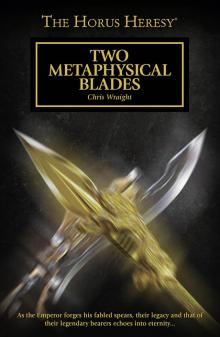 Two Metaphysical Blades
Two Metaphysical Blades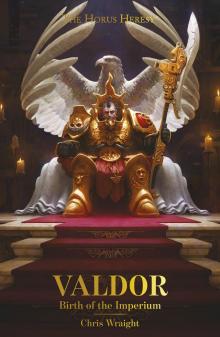 Valdor: Birth of the Imperium
Valdor: Birth of the Imperium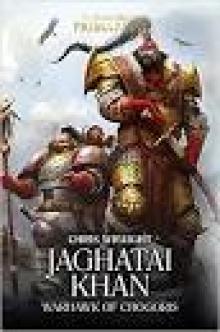 JAGHATAI KHAN WARHAWK OF CHOGORIS
JAGHATAI KHAN WARHAWK OF CHOGORIS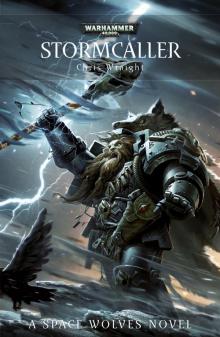 Stormcaller
Stormcaller Child of Chaos
Child of Chaos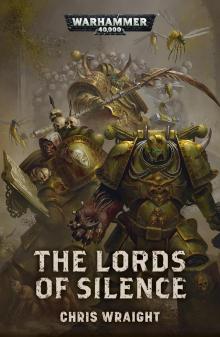 The Lords of Silence
The Lords of Silence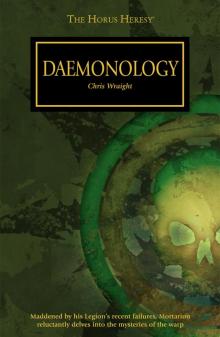 Daemonology
Daemonology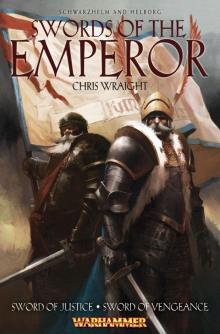 Swords of the Emperor
Swords of the Emperor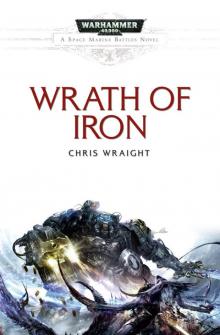 Wrath of Iron
Wrath of Iron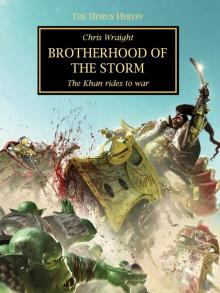 Brothers of the Storm
Brothers of the Storm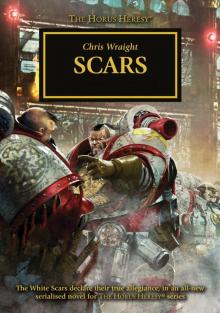 Horus Heresy: Scars
Horus Heresy: Scars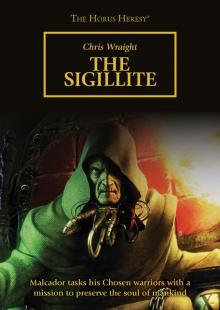 The Sigillite
The Sigillite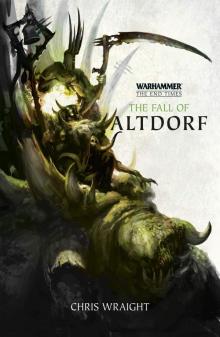 The End Times | The Fall of Altdorf
The End Times | The Fall of Altdorf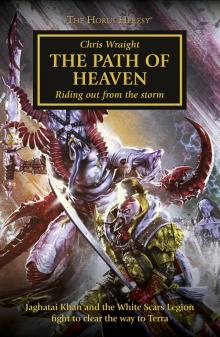 The Path of Heaven
The Path of Heaven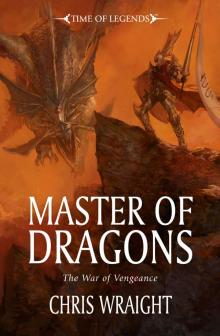 Master of Dragons
Master of Dragons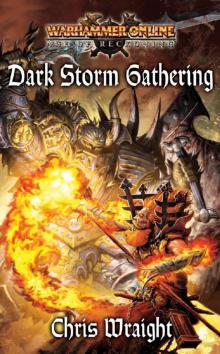 WH-Warhammer Online-Age of Reckoning 02(R)-Dark Storm Gathering
WH-Warhammer Online-Age of Reckoning 02(R)-Dark Storm Gathering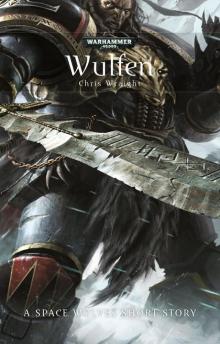 Wulfen
Wulfen Battle Of The Fang
Battle Of The Fang Onyx
Onyx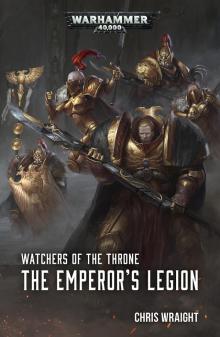 Watchers of the Throne: The Emperor’s Legion
Watchers of the Throne: The Emperor’s Legion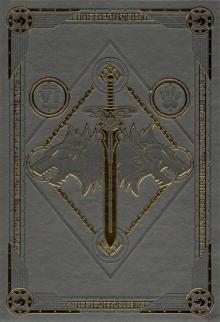 Leman Russ: The Great Wolf
Leman Russ: The Great Wolf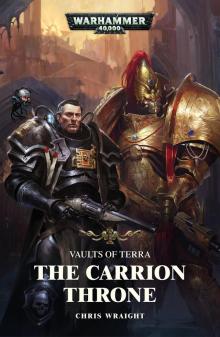 Vaults of Terra: The Carrion Throne
Vaults of Terra: The Carrion Throne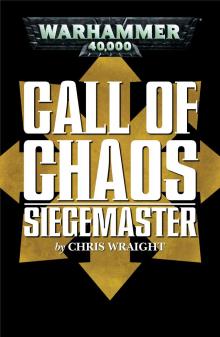 Siegemaster
Siegemaster STARGATE ATLANTIS: Dead End
STARGATE ATLANTIS: Dead End Scars
Scars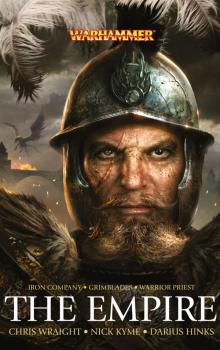 The Empire Omnibus
The Empire Omnibus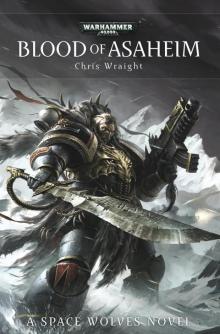 Blood of Asaheim
Blood of Asaheim